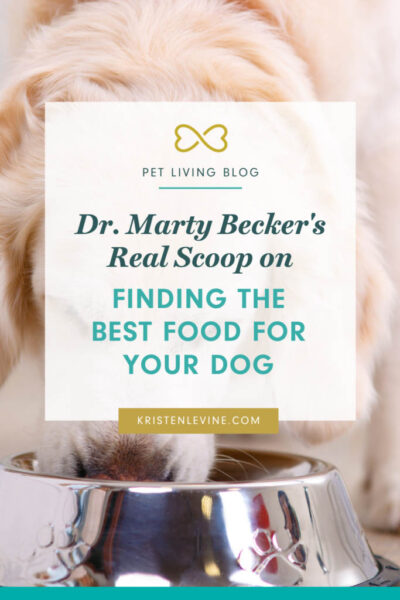
Dr. Marty Becker’s Real Scoop on Finding the Best Dog Food for Your Dog
Are you perplexed by the ingredients in your pet’s food? If so, you’re not alone. Surveys conducted by Purina reveal that pet parents believe their dogs’ nutrition is more confusing than their own!
To help dog moms and dads cut through the clutter, Purina recently hosted an hour-long YouTube Live session on debunking myths about pet food ingredients, with America’s veterinarian, Dr. Marty Becker. Yours truly was invited, along with several other bloggers.
Pin Me!


As always, I learned a lot from Dr. Becker. He’s smart, funny and always takes such a practical approach to doing right by your pet. (He’s also not above showing off his freshly painted fingernails and toes, courtesy of his young granddaughter Reagan! See images below.)
For me, the most important takeaway from Dr. Becker’s session was that choosing a quality diet for your pet and feeding in the right quantity can add up to two years to their life! Add good oral care while keeping your pet at a healthy weight, and you are literally helping your pet live the longest, healthiest life possible.
So what are some of the best ways to keep your pet healthy, happy and enjoying a good quality of life? I’ve outlined a checklist for both Type A and Type B pet parents. If you’re Type-A, you want to know ALL you can about your pet’s diet options and you have the time, (or will make the time) to do so. If you’re Type-B, you’re BUSY, and need a BOTTOM line approach to making the best choice for your pet!
TIPS for Type-A Pet Parents
Do:
- Take your pet’s lifestyle and age (puppy, adult, mature, active, couch potato, senior) into consideration when choosing a diet.
- Ask your veterinarian for advice about what to feed your pet for a nutritionally balanced diet. Nowadays, vets are required to study nutrition in veterinary school, and can be a great help. Be sure to tell them where you shop (grocery store, online shopping, a pet supply store, or boutique) so they can give you options to consider.
- Talk to a board-certified veterinary nutritionist about what diet or lifestyle formula is best for your pet.
- Realize that most (but not all) pet food companies contract with manufacturers to produce their food. In other words, one pet food factory might make food for dozens of different brands.
- Ask questions! Once you’ve narrowed your pet food selections, call the companies and ask:
- Do you own the pet food plant? (If not, who does? Then research them!) Where is it located?
- Where do you source the ingredients in this food?
- What are the ingredients and what type of by products are used? (Hint: by products are not a bad thing. See below.)
- Is there a staff research nutritionist I can talk to (ideally, one with a masters in nutrition)?
- Have you had any recalls? If so, what were the circumstances?
- What are your safety standards?
- Do your ingredients have a USDA seal of approval?
- Do you verify finished goods?
- Do you employ food scientists?
- Cross-reference what your vet recommends with what you learn from the pet food company.
- Visit Petfoodinstitute.org for more information.
Don’t:
- Do not ask the clerk at the pet supply store for advice on your pet’s diet. (The guidance you get from a store employee is probably from the last pet food company that was in the store to give them a biased, scripted coaching session on how to sell their product.)
- Don’t fall prey to just looking at ingredients or packaging—never buy pet food because you like the packaging!
- Don’t buy pet food from a company with a history of a recall.
- Do not overspend on pet food and underspend on veterinary care.
Also keep these things in mind:
- By-products aren’t bad. For example, the heart, liver and spleen are among the most nutrient-rich organs and a great source of protein, healthy fats, etc. As a matter of fact, what we call by-products, many other countries call human-grade delicacies!
- Grains aren’t bad for your pet either, unless they have an allergy which, according to Dr. Becker, is very rare.
- Use a water fountain instead of a bowl of water. In nature, running water means health, stagnant water means danger. Your pet will drink more water from a fountain, improving hydration and overall health.
- Nutrients are more important than ingredients. Marketing focuses on ingredients but you should be looking at the overall nutritional value of the food your pet is eating.

TIPS for Type-B Pet Parents
Check out this simple, 1, 2, 3 approach!
- Ask your veterinarian to recommend a nutritionally balanced pet food and in what quantity. Make sure it addresses your pet’s specific needs and is within your budget.
- Also talk with your vet about how to provide your pet with good oral care (and then do it!).
- Monitor your pet’s health and weight on their new food, and report any changes (good or bad) to your veterinarian.







Comments (0)